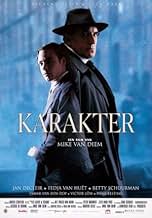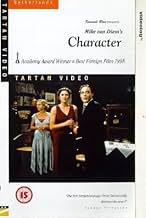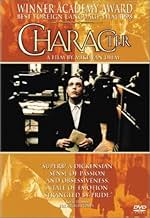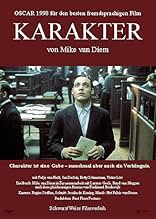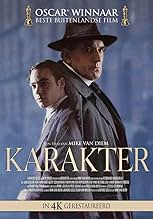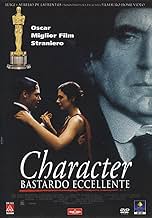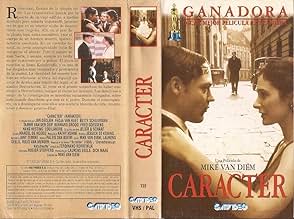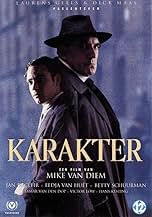Karakter
- 1997
- Tous publics
- 2h 2m
IMDb RATING
7.7/10
12K
YOUR RATING
Jacob Katadreuffe lives mute with his mother, has no contact with his father who only works against him and wants to become a lawyer, at all costs.Jacob Katadreuffe lives mute with his mother, has no contact with his father who only works against him and wants to become a lawyer, at all costs.Jacob Katadreuffe lives mute with his mother, has no contact with his father who only works against him and wants to become a lawyer, at all costs.
- Won 1 Oscar
- 18 wins & 7 nominations total
Featured reviews
It's no wonder that this Dutch drama got the 1997 Academy Award for the best foreign country movie in the year of "Titanic". It tells the rise-and-fall-story of a young man in the Netherlands of the 1920's who's working hard to escape from the ghetto and to become an idealistic lawyer. Unfortunately his brutal an tyrannic father fights against him in any possible way, and at the end father and son are facing in a hard fight for life and death.
The story is great, the characters (sic!) of the plot even more, and the acting is pure adrenaline-driven. The whole atmosphere, supported by the dark filming locations of Amsterdam, Belgium, Germany (the Speicherstadt in Hamburg) and Poland, is disturbing and depressing. A great psycho drama and insight into the human psyche with a powerful performance by Jan Decleir as villain Dreverhaven that can easily compete with Anthony Hopkins' Hannibal Lecter movies!
The story is great, the characters (sic!) of the plot even more, and the acting is pure adrenaline-driven. The whole atmosphere, supported by the dark filming locations of Amsterdam, Belgium, Germany (the Speicherstadt in Hamburg) and Poland, is disturbing and depressing. A great psycho drama and insight into the human psyche with a powerful performance by Jan Decleir as villain Dreverhaven that can easily compete with Anthony Hopkins' Hannibal Lecter movies!
It is not too frequent that we get Dutch programmes of films or TV-minis in this corner of Europe, and when they do appear it is thanks to the regional Basque TV Station `EITB'. Indeed over two years has passed since seeing the excellent mini `Charlotte Sophie Bentinck' (1996) (qv) and seeing the very interesting `Karakter' recently.
Set in the 1920's this film has excellent mise-en-scéne wonderfully photographed, mostly in Holland and Belgium, but with some scenes shot in Wroclaw, Poland, with street-cars of the times, in which the darkened almost greyish brickwork of the tenement buildings and the industrial port areas takes on an intense protagonism in the film's development. Palais van Boem's musical contribution is mostly just right, though at times seemed to be a little boorish.
A young, illegitimate boy grows up with his unmarried mother, whilst the father, Dreverhaven, continuously appeals to her to marry him, but always rejected. However, the father seems to do everything possible to disrupt the young man's life, as his mother becomes more and more detached and uncaring. It would seem that Dreverhaven is playing out a real-life game of chess around his son Jacob, as if trying to corner him into submission and apathy, but which the young man manages to survive. The psychological impression is that one or the other would undo his `bitter foe', but that despite the father's vast fortune and power the struggle of will would rebound against him.But as the Dutch saying goes: De één zijn dood, is de ander zijn brood'
This is no `thriller' in the ordinary sense, more a psychological suspense which requires attention throughout. The acting is magnificent: both Fedja van Huêt and Jan Decleir play out their parts with just the right touch, especially Decleir, and Lou Landré as Rentenstein is almost spellbinding, not to be missed.
Here is another example of the unarguable fact: here in Europe we make cinema, not blockbuster box-office hits.
Set in the 1920's this film has excellent mise-en-scéne wonderfully photographed, mostly in Holland and Belgium, but with some scenes shot in Wroclaw, Poland, with street-cars of the times, in which the darkened almost greyish brickwork of the tenement buildings and the industrial port areas takes on an intense protagonism in the film's development. Palais van Boem's musical contribution is mostly just right, though at times seemed to be a little boorish.
A young, illegitimate boy grows up with his unmarried mother, whilst the father, Dreverhaven, continuously appeals to her to marry him, but always rejected. However, the father seems to do everything possible to disrupt the young man's life, as his mother becomes more and more detached and uncaring. It would seem that Dreverhaven is playing out a real-life game of chess around his son Jacob, as if trying to corner him into submission and apathy, but which the young man manages to survive. The psychological impression is that one or the other would undo his `bitter foe', but that despite the father's vast fortune and power the struggle of will would rebound against him.But as the Dutch saying goes: De één zijn dood, is de ander zijn brood'
This is no `thriller' in the ordinary sense, more a psychological suspense which requires attention throughout. The acting is magnificent: both Fedja van Huêt and Jan Decleir play out their parts with just the right touch, especially Decleir, and Lou Landré as Rentenstein is almost spellbinding, not to be missed.
Here is another example of the unarguable fact: here in Europe we make cinema, not blockbuster box-office hits.
Many people describe the movie as distant and cold. But that's exactly what the makers were aiming for to stay congruent with the 2 novels of Bordewijk where Karakter / Character is based upon. Bordewijk's style is often described as Nieuwe Zakelijkheid (best translation: New Objectivity, think Sinclair Lewis), a counter movement to the upcoming Expressionism in the 20s of the last century. Instead of the idealism of Expressionists more emphasis was put on reality, objectivity and facts in a sober and distant form with little room for frivolity, superficial beauty, sentimentality or explaining behavior. Not only does the style of the novels reflect this, the world the characters inhabit has the same characteristics. Viewed from this standpoint they made an amazing adaptation from a novel, correct in both style and content. But the movie defines more than an art movement, because the characters portrayed tell a lot about the Dutch in general, and this in a way also defines Dutch national identity.
The story itself is about perseverance. Jacob is the son of a relation without love. His parents never marry, the mother leaves soon after she finds out she is pregnant. His mother is stubborn, his father a man without compassion working as a bailiff. Both parents push their son in their own way, his mother almost drives him out of her home, his father lends him money thus starting a battle over the upper hand in their relationship. The father brings adversity to his son in the hope to make him stronger. In line with the style of the novel none of the characters ever experience love. In fact the whole movie contains not one passionate scene. The only character showing emotion (De Gankelaar, an excellent role played by Victor Löw) leaves the country. It has a Nietzschian philosophical angle with the debate of lightness and weight: Jacob's burdens give his life a meaning, but are the sacrifices worth it?
Location scouts did a wonderful job here, because Karakter recreates pre-war Rotterdam, a city almost totally flattened by the Nazis (There is a harrowing photo of the city after the bombardments with only the main church still standing). The production and art departments made the sets with their darkish colors fitting the form and content of the movie. The camera is used in a way to create some fluidity in the scenes: It almost never is static as with so many character dramas.
Fedja van Huêt as Jacob and Jan Decleir as Dreverhaven seem to understand what's going on here and act accordingly. Tamar van den Dop as Lorna is probably the greatest weakness in the movie, with a terrible diction and limited body movement she's miscast here.
Mike van Diem makes only one movie, wins an Oscar, and disappears almost from the earth. Although rumor has it he does some script doctoring in Hollywood, with his current production rate he will surpass even Malick. As for now, this is by far the best Dutch movie ever made.
The story itself is about perseverance. Jacob is the son of a relation without love. His parents never marry, the mother leaves soon after she finds out she is pregnant. His mother is stubborn, his father a man without compassion working as a bailiff. Both parents push their son in their own way, his mother almost drives him out of her home, his father lends him money thus starting a battle over the upper hand in their relationship. The father brings adversity to his son in the hope to make him stronger. In line with the style of the novel none of the characters ever experience love. In fact the whole movie contains not one passionate scene. The only character showing emotion (De Gankelaar, an excellent role played by Victor Löw) leaves the country. It has a Nietzschian philosophical angle with the debate of lightness and weight: Jacob's burdens give his life a meaning, but are the sacrifices worth it?
Location scouts did a wonderful job here, because Karakter recreates pre-war Rotterdam, a city almost totally flattened by the Nazis (There is a harrowing photo of the city after the bombardments with only the main church still standing). The production and art departments made the sets with their darkish colors fitting the form and content of the movie. The camera is used in a way to create some fluidity in the scenes: It almost never is static as with so many character dramas.
Fedja van Huêt as Jacob and Jan Decleir as Dreverhaven seem to understand what's going on here and act accordingly. Tamar van den Dop as Lorna is probably the greatest weakness in the movie, with a terrible diction and limited body movement she's miscast here.
Mike van Diem makes only one movie, wins an Oscar, and disappears almost from the earth. Although rumor has it he does some script doctoring in Hollywood, with his current production rate he will surpass even Malick. As for now, this is by far the best Dutch movie ever made.
Karakter is quite stunning on several levels. The cinematography is gorgeous - without the use of any noticeable special effects or surrealistic dream sequences. The quality of the filming surpasses that of most movies.
One of the best things for me (as an American) about watching foreign films is not knowing who most of the actors are, and this makes it easier to completely accept them as the characters they play. The two leads were outstanding, and the supporting characters (particularly Betty Schuurman as Joba, and Nans Kesting as Jan Maan) were very effective.
I found the story to be engrossing and - more than anything, the pacing amazed me. A person accustomed to reading classic novels would probably appreciate the way this film unfolded. There is a desire to reach the end, but no hurry.
For sure, this film wouldn't interest everyone, but I rank it among my favorite films. It deserved to win the Academy Award for Best Picture last year: for the story, for the performances, for the direction ... it's rare that one finds a movie so well-put together.
One of the best things for me (as an American) about watching foreign films is not knowing who most of the actors are, and this makes it easier to completely accept them as the characters they play. The two leads were outstanding, and the supporting characters (particularly Betty Schuurman as Joba, and Nans Kesting as Jan Maan) were very effective.
I found the story to be engrossing and - more than anything, the pacing amazed me. A person accustomed to reading classic novels would probably appreciate the way this film unfolded. There is a desire to reach the end, but no hurry.
For sure, this film wouldn't interest everyone, but I rank it among my favorite films. It deserved to win the Academy Award for Best Picture last year: for the story, for the performances, for the direction ... it's rare that one finds a movie so well-put together.
In the 20's, in Netherlands, Jacob Willem Katadreuffe (Fedja van Huêt) has just concluded the law school and has an argument with the High Court Enforcement Officer Dreverhaven (Jan Decleir) at his office. Katadreuffe leaves the place covered in blood. On the next morning, he is arrested by the police for the murder of Dreverhaven. He claims that he is innocent and discloses the story of his life to the Chief of Police.
His mother Joba (Betty Schuurman) was the maid at Dreverhaven. One night, she is raped by him and a couple of weeks later she learns that she is pregnant. Dreverhaven proposes to marry her but Joba quits her job and leaves his house. Along the years, Katadreuffe is bullied at school and called bastard by his mates and his mother never talks to him. One day, he is involved by other kids in a theft of bread and arrested by the police. When he calls his biological father to help him, Dreverhaven tells the police that he does not know who Katadreuffe is. The boy is intelligent and learns English reading a superseded and incomplete edition of encyclopedia that was left behind by the previous tenants of his apartment. Katadreuffe is also ambitious and asks for a job in a law office, where he becomes the protégé of his mentor De Gankelaar (Victor Löw). Soon he falls in unrequited love with the secretary Lorna Te George Victor (Tamar van den Dop). Along the years, Dreverhaven uses his power to harm him. When he concluded his course, he decides to pay a visit to Dreverhaven to tell him that he has wined their dispute. May Katadreuffe have killed Dreverhaven?
"Karakter" is a dark film about a young man needy of fatherly love. The intercourse between his parents is never clear whether it was a rape, as per the trailer, or consensual sex. In the view of Katadreuffe, his mother has always been "mute". But maybe it could be a trauma for her only intercourse since she is a stubborn woman. Dreverhaven is a mysterious and ambiguous character. Is he only cruel or is he trying to harden his son to face the challenges of the brutal society where they live and be a winner? The screenplay is very well-written and keeps the attention of the viewer until the last scene. The cinematography, set decoration and art direction are perfect and bring the viewer to Netherlands in the middle 20's. The cast has magnificent performance highlighting Jan Decleir. My vote is eight.
Title (Brazil): "Caráter" ("Character")
His mother Joba (Betty Schuurman) was the maid at Dreverhaven. One night, she is raped by him and a couple of weeks later she learns that she is pregnant. Dreverhaven proposes to marry her but Joba quits her job and leaves his house. Along the years, Katadreuffe is bullied at school and called bastard by his mates and his mother never talks to him. One day, he is involved by other kids in a theft of bread and arrested by the police. When he calls his biological father to help him, Dreverhaven tells the police that he does not know who Katadreuffe is. The boy is intelligent and learns English reading a superseded and incomplete edition of encyclopedia that was left behind by the previous tenants of his apartment. Katadreuffe is also ambitious and asks for a job in a law office, where he becomes the protégé of his mentor De Gankelaar (Victor Löw). Soon he falls in unrequited love with the secretary Lorna Te George Victor (Tamar van den Dop). Along the years, Dreverhaven uses his power to harm him. When he concluded his course, he decides to pay a visit to Dreverhaven to tell him that he has wined their dispute. May Katadreuffe have killed Dreverhaven?
"Karakter" is a dark film about a young man needy of fatherly love. The intercourse between his parents is never clear whether it was a rape, as per the trailer, or consensual sex. In the view of Katadreuffe, his mother has always been "mute". But maybe it could be a trauma for her only intercourse since she is a stubborn woman. Dreverhaven is a mysterious and ambiguous character. Is he only cruel or is he trying to harden his son to face the challenges of the brutal society where they live and be a winner? The screenplay is very well-written and keeps the attention of the viewer until the last scene. The cinematography, set decoration and art direction are perfect and bring the viewer to Netherlands in the middle 20's. The cast has magnificent performance highlighting Jan Decleir. My vote is eight.
Title (Brazil): "Caráter" ("Character")
Did you know
- TriviaAlthough the story takes place in the Dutch city of Rotterdam, many scenes were filmed in other cities across The Netherlands and Europe. This was because Rotterdam has very few buildings from this era left following heavy bombing during the Second World War. Filming locations included: Hamburg (Germany), Wroclaw (Poland), Antwerp and Ghent (Belgium) and The Hague (The Netherlands).
- GoofsIn one of the street scenes, you can see an extra in modern outfit and with no headwear on.
- Quotes
Joba: Why don't you leave our boy in peace?
Dreverhaven: I'll strangle him for nine-tenths, and the last tenth will make him strong.
- How long is Character?Powered by Alexa
Details
- Release date
- Countries of origin
- Official site
- Languages
- Also known as
- Character
- Filming locations
- Wroclaw, Dolnoslaskie, Poland(Miernicza 27, Wroclaw, Dolnoslaskie, Poland)
- Production companies
- See more company credits at IMDbPro
Box office
- Budget
- $4,500,000 (estimated)
- Gross US & Canada
- $623,983
- Opening weekend US & Canada
- $37,268
- Mar 29, 1998
- Gross worldwide
- $623,983
- Runtime2 hours 2 minutes
- Color
- Sound mix
- Aspect ratio
- 1.85 : 1
Contribute to this page
Suggest an edit or add missing content



